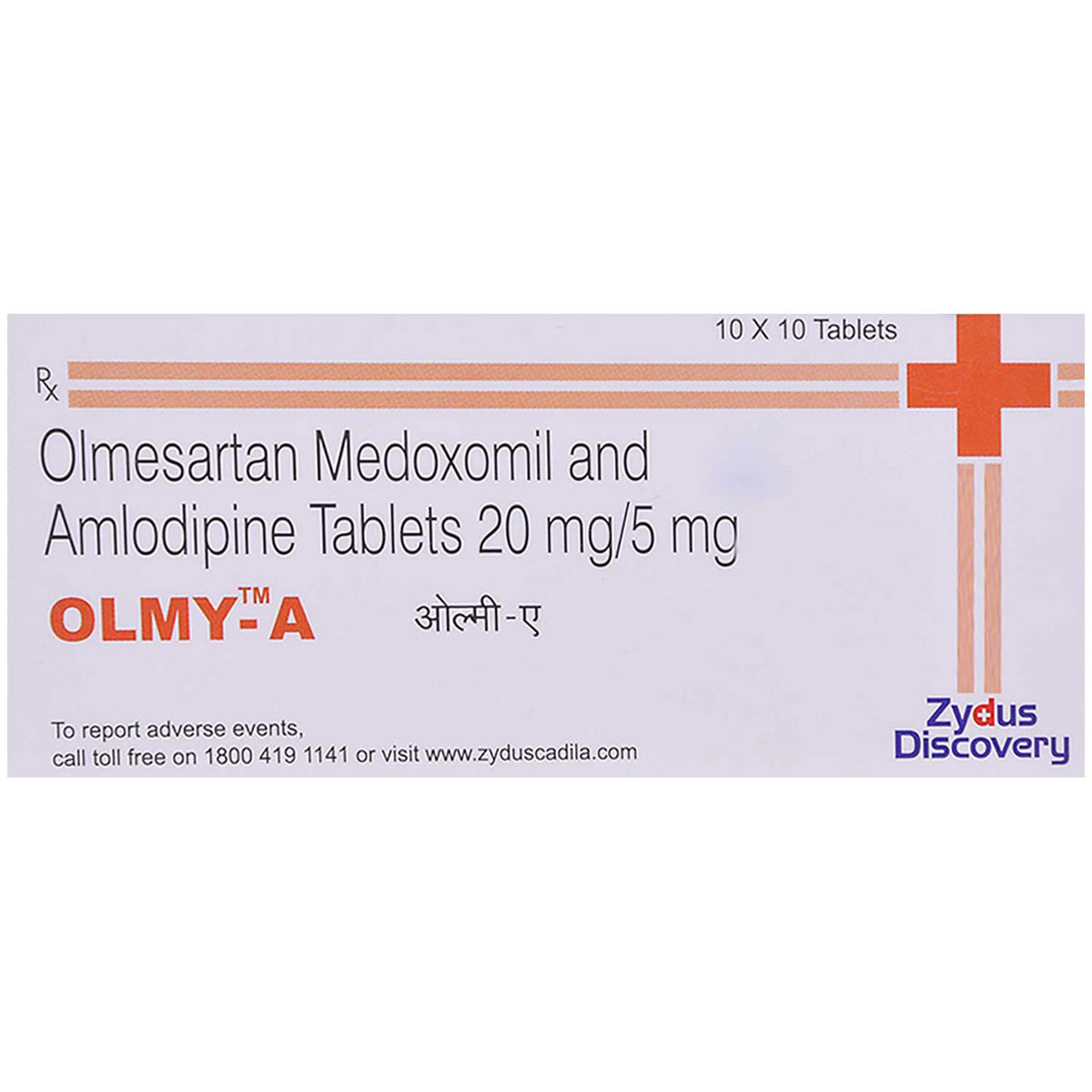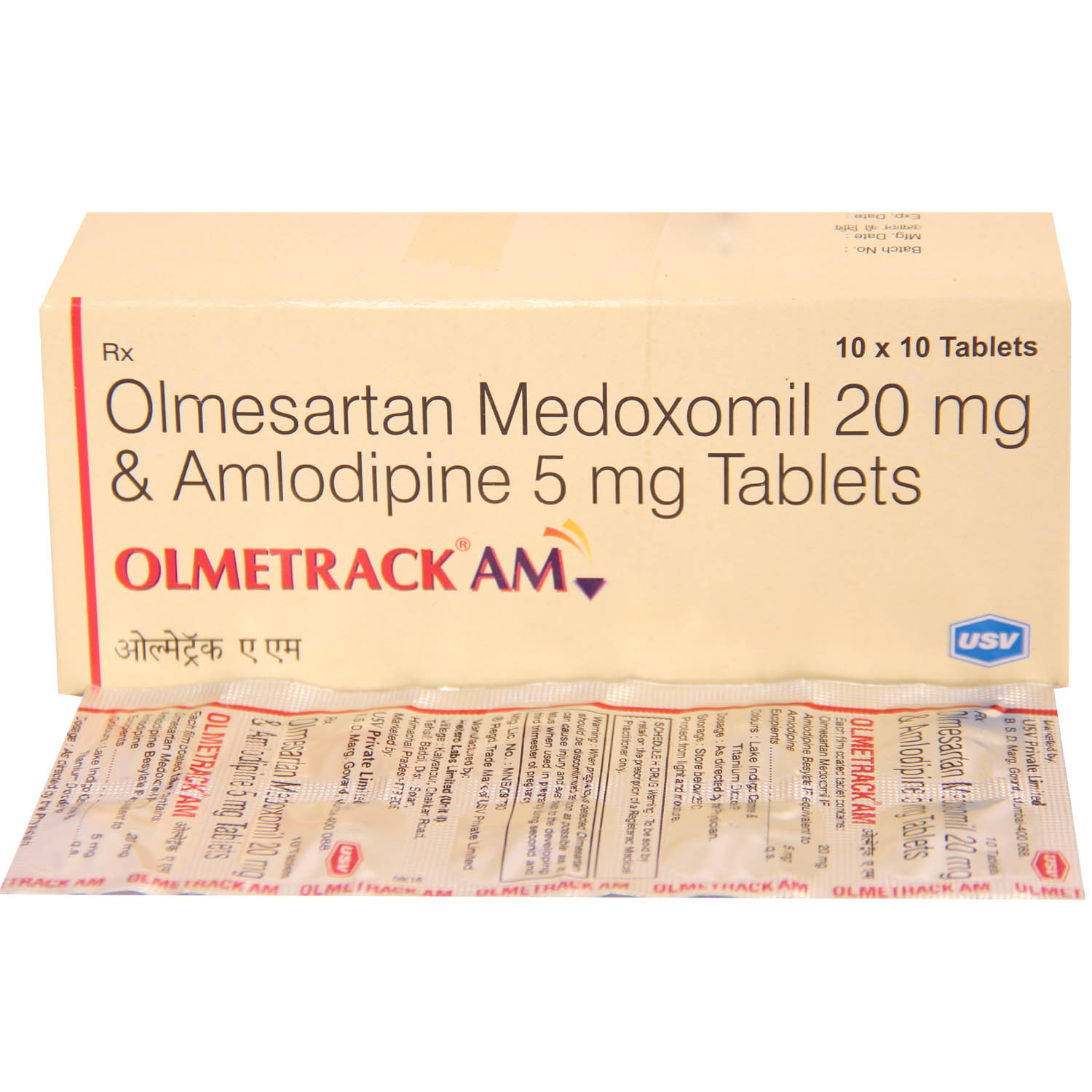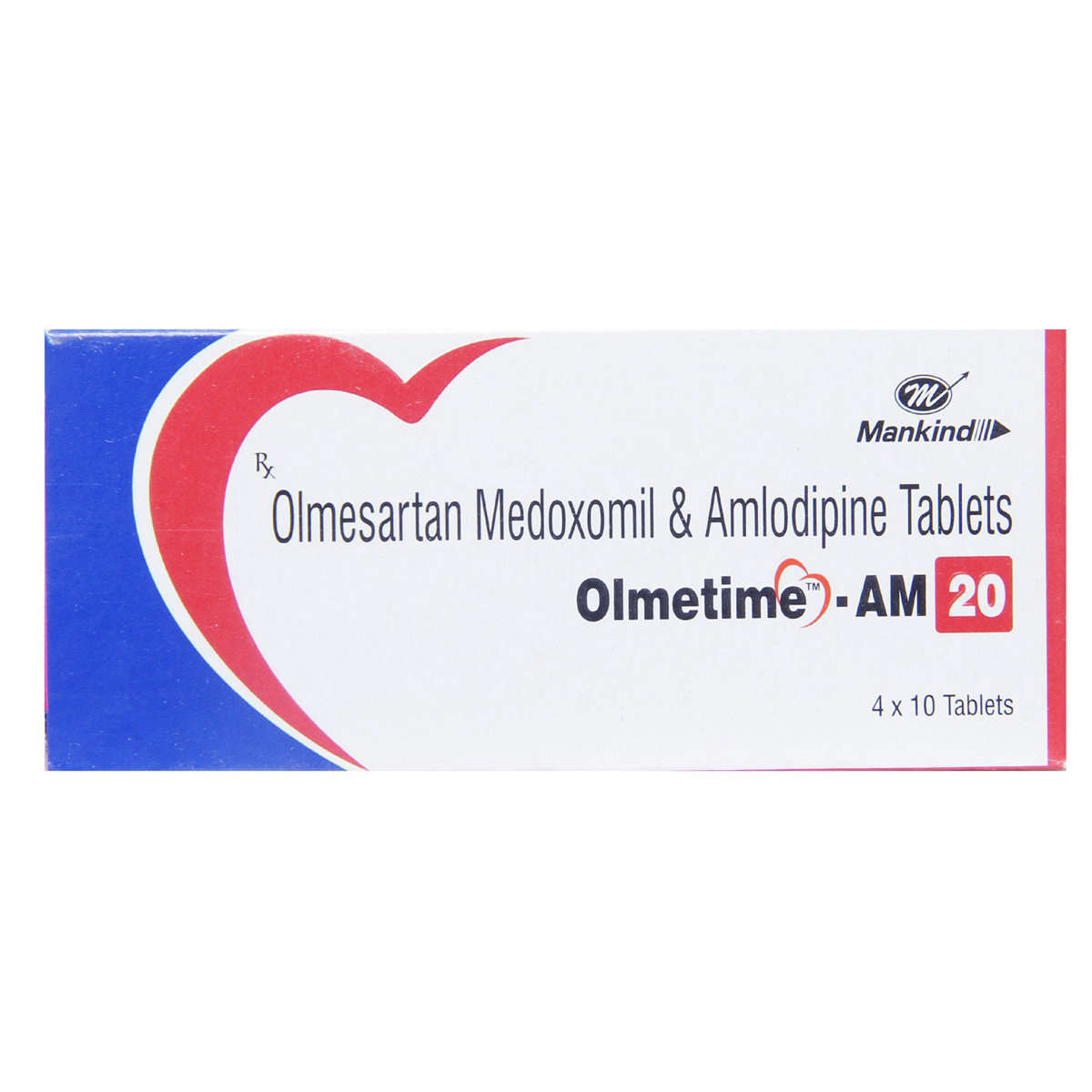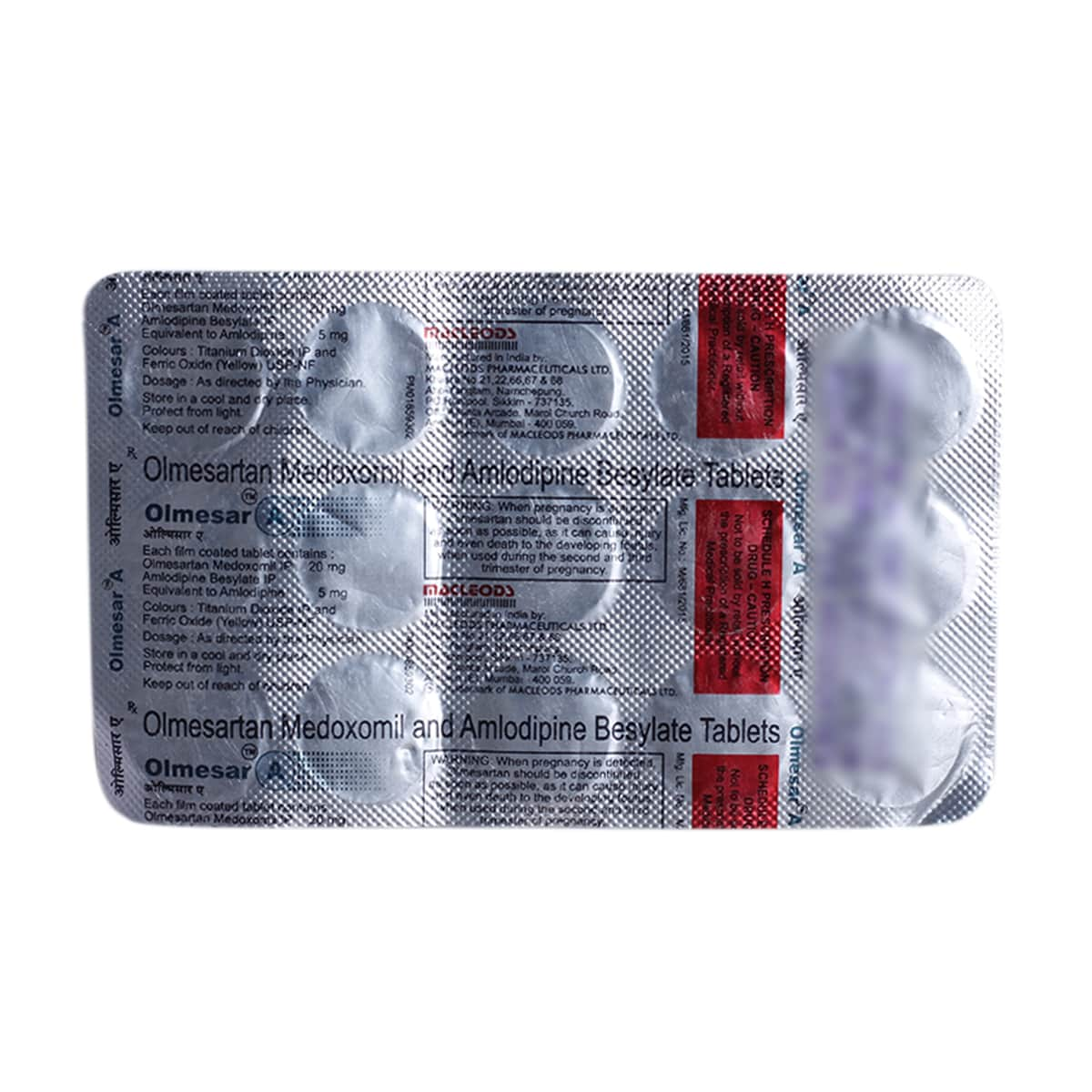Olmesartan+amlodipine
About Olmesartan+amlodipine
Olmesartan+amlodipine belongs to the 'anti-hypertensive drugs' class used to treat high blood pressure. Hypertension or high blood pressure is a chronic condition in which the blood's force against the artery wall is high. As a result, it leads to heart disease, irregular heartbeat, and other complications.
Olmesartan+amlodipine contains Olmesartan (angiotensin receptor blocker) and Amlodipine (calcium channel blocker). Olmesartan works by blocking the hormone angiotensin, thereby relaxing blood vessels. This allows the blood to flow more smoothly and the heart to pump more efficiently. Amlodipine, on the other hand, acts by relaxing the blood vessels. This reduces the heart's workload and makes the heart more efficient at pumping blood throughout the body. Thus, collectively, both help lower high blood pressure, reducing heart attack or stroke chances.
You can take Olmesartan+amlodipine with food or without food with a glass of water. Do not chew, bite, or break it. Your doctor will advise you on how often you should take your tablets based on your medical condition. In some cases, you may experience headaches, drowsiness, ankle swelling, nausea, dizziness, and low blood pressure. Most of these side effects of Olmesartan+amlodipine do not require medical attention and gradually resolve over time. However, if the side effects are persistent, reach out to your doctor. It is advisable to drink plenty of fluids while taking Olmesartan+amlodipine.
Try not to stop taking Olmesartan+amlodipine on your own. Inform your doctor, and your dose might be gradually lowered to avoid a rise in blood pressure and increasing the risk of getting heart disease and stroke. Inform your doctor if you are suffering from kidney, liver, heart disease, or diabetes. If you are pregnant or breastfeeding, please tell your doctor, as it is not recommended for use in pregnancy. It should not be given to children less than 12 years of age. In diabetic patients, it is advised not to take Aliskiren with Olmesartan+amlodipine as it may cause an increased risk of low blood pressure (hypotension) and change in kidney functions.
Do not use Olmesartan+amlodipine if you have low blood pressure (hypotension) or cardiogenic shock (sudden stopping blood flow to the heart). Please tell your doctor if you are taking any other medicines or are allergic to Olmesartan+amlodipine. Reducing the amount of table salt (sodium chloride) in your food often relieves the body's swelling. Grapefruit juice and St. John's wort plant should not be consumed when taking Olmesartan+amlodipine as it is contraindicated.
Uses of Olmesartan+amlodipine
Medicinal Benefits
Olmesartan+amlodipine contains Olmesartan (angiotensin receptor blocker) and Amlodipine (calcium channel blocker). Olmesartan works by blocking the hormone angiotensin, thereby relaxing blood vessels. This allows the blood to flow more smoothly and the heart to pump more efficiently. Amlodipine, on the other hand, acts by relaxing the blood vessels. This reduces the heart's workload and makes the heart more efficient at pumping blood throughout the body. Thus, both help lower high blood pressure, reducing the chances of heart attack or stroke.
Directions for Use
Storage
Side Effects of Olmesartan+amlodipine
- Nausea
- Dizziness
- Headaches
- Drowsiness
- Ankle swelling
- Low blood pressure
Drug Warnings
Olmesartan+amlodipine should not be given to people allergic to Olmesartan+amlodipine or many of its ingredients. If you have low blood pressure (less than 90 mm of Hg), have had a heart attack, kidney disease, or liver disease, are pregnant, or planning to get pregnant and breastfeeding women; do not take Olmesartan+amlodipine. Besides this, it is contraindicated in low blood pressure (hypotension), cardiogenic shock (sudden stopping of blood flow to the heart), and aortic stenosis (heart valve problem). Olmesartan+amlodipine can pass into breast milk, but its effect on the baby is unknown. So, it is better to tell your doctor if you take Olmesartan+amlodipine and breastfeeding. Grapefruit juice and St. John's wort plant should not be consumed when taking Olmesartan+amlodipine as it is contraindicated. Drinking alcohol while using Olmesartan+amlodipine can cause low blood pressure, so avoid alcoholic beverages.
Drug Interactions
Drug-Drug Interactions: Olmesartan+amlodipine may interact with high blood pressure lowering pills (aliskiren, metoprolol, ramipril, hydrochlorothiazide). These drugs may enhance potassium levels in the blood, such as ACE inhibitors (benazepril/lisinopril, birth control pills) and painkillers (ibuprofen, aspirin).
Drug-Food Interactions: Olmesartan+amlodipine may interact with grapefruit, grapefruit juices, and St. John’s wort (a plant used to treat depression). Hence it should not be taken with Olmesartan+amlodipine.
Drug-Disease Interactions: Olmesartan+amlodipine should not be given to people with cardiogenic shock (when the heart fails to pump required blood to the body), heart valve problems (stenosis), low blood pressure (hypotension), heart failure, liver or kidney diseases.
Drug-Drug Interactions Checker List:
Safety Advice

Alcohol
cautionDo not consume alcohol along with Olmesartan+amlodipine to avoid unpleasant side effects.

Pregnancy
unsafeOlmesartan+amlodipine is not recommended for use in pregnancy as it may harm your foetus. Please consult your doctor.

Breast Feeding
unsafeOlmesartan+amlodipine is not recommended for breastfeeding mothers. It is excreted into milk in small amounts and is cleared slowly. It can accumulate in infants, especially newborns or preterm infants. Lactation might also be suppressed due to the effect of Olmesartan+amlodipine.

Driving
cautionDriving after taking Olmesartan+amlodipine is not recommended as it may occasionally cause drowsiness or fatigue.

Liver
cautionOlmesartan+amlodipine to be taken with caution, especially if you have a liver disease history. Your doctor may adjust the dose depending on your medical condition and your reaction to treatment.

Kidney
cautionOlmesartan+amlodipine to be taken with caution, especially if you have a history of kidney diseases/conditions. Your doctor may adjust the dose depending on your medical condition.

Children
unsafeUse of Olmesartan+amlodipine in children under 12 years of age is not recommended as the safety and efficacy of Olmesartan+amlodipine in these age groups have not yet been established.
Habit Forming
Diet & Lifestyle Advise
- Keep your weight under control with BMI of 19.5-24.9.
- Do regular physical activity or exercise for at least 150 minutes per week, or about 30 minutes most days of the week. Doing this can help lower your raised blood pressure by about 5 mm Hg.
- Opt for a diet rich in whole grains, fruits, veggies, and low-fat dairy products.
- Limit sodium chloride (table salt) intake in your daily diet to 2300 mg per day or less than 1500 mg is ideal for most adults.
- Quitting smoking is the best strategy to lower the risk of heart disease.
- Avoid chronic stress, as it can raise your blood pressure. Try to enjoy and spent time with your loved ones to cope with stress and practice mindfulness techniques.
- Monitor your blood pressure daily and if there is too much fluctuation, immediately contact your doctor.
- Try to include heart-healthy omega-3 fatty acids containing food and drinks in your daily diet. You can also use low-fat cooking oil like olive oil, soybean oil, canola oil, and coconut oil to lower your elevated blood pressure.
Special Advise
- When pregnancy is detected, discontinue Olmesartan+amlodipine as drugs that act directly on the renin-angiotensin system can cause severe injury and even death to the developing fetus (unborn baby).
- Olmesartan+amlodipine should be taken at the same time every day for its maximum effects to be seen and for increased compliance.
- Consumption of Olmesartan+amlodipine may cause dizziness. Avoid activities like driving while on this medication.
- A sudden drop in blood pressure may be seen while on this medication, especially when you start taking it, leading to dizziness. Changing your posture at a slower rate might help counter this.
- Ankle swelling is sometimes seen as a side effect of Olmesartan+amlodipine as it contains amlodipine. Consult your doctor if this or other side effects cause trouble or are persistent.
Patients Concern
Disease/Condition Glossary
Blood pressure: It is the measurement of the force that our heart uses to pump blood to all parts of the body. Hypertension is a chronic condition when blood pressure is too high. This condition can lead to hardened arteries (blood vessels), decreasing the blood and oxygen flow to the heart. Raised blood pressure can cause chest pain (angina) and heart attack (when the blood supply to the heart is blocked). High blood pressure also causes brain damage (stroke) and kidney failure. High blood pressure can be diagnosed with the help of a blood pressure monitor. Systolic pressure is the pressure with which the heart pumps blood. On the other hand, diastolic pressure is when your heart is resting between heartbeats. If your blood pressure is 140/90 mm of Hg, the systolic pressure is 140 mm of Hg, and diastolic pressure is 90 mm of Hg. Ideal blood pressure should be between 90/60 mm of Hg and 120/80 mm of Hg.
FAQs
Persons older than 65 years can take Olmesartan+amlodipine after consulting with the doctor. However, Olmesartan+amlodipine is safe to use by elderly patients if prescribed by the doctor.
Olmesartan+amlodipine is a Pregnancy Category D medicine that can harm the fetus, so when pregnancy is detected, discontinue Olmesartan+amlodipine with immediate effect.
It is not recommended that diabetic patients take Aliskiren with Olmesartan+amlodipine because it increases the risk of low blood pressure (hypotension) and changes in kidney functions.
If you have missed a dose of Olmesartan+amlodipine, you are advised to take it as soon as you remember. However, try not to miss a dose in the first place; if it's time for you to take your next dose, then do not take both the doses together. Take only one dose; taking a double dose of Olmesartan+amlodipine will lead to low blood pressure.
Inform your doctor and monitor your blood pressure for at least two weeks before stopping the medicine. Depending upon your current blood pressure readings, there is a possibility your doctor may lower your medicine dosage and not recommend discontinuing it.
Olmesartan+amlodipine can be safely taken as long as your doctor prescribes it. High blood pressure is life-long, and one should not abruptly discontinue it without discussing it with a doctor.
Olmesartan+amlodipine is restricted in people with known allergies to any of this medicine's components. It should be used with caution in people with liver impairment. It should also be avoided in women's second and third trimesters of their pregnancy.
Yes, Olmesartan+amlodipine contains amlodipine, known to cause ankle swelling upon long-term use. Please try to keep your feet up when sitting for long hours. If the problem persists still, consult your doctor and do as advised.
It's unlikely that Olmesartan+amlodipine affects fertility in men or women. However, there's not enough evidence to say for certain. For the best advice, consult your doctor.
High blood pressure during pregnancy is called 'Pregnancy-induced hypertension' (PIH). It is harmful to both the baby and the mother. In the mother, very high blood pressure can cause seizures (fits), headache, swelling of feet, kidney damage, and a higher risk of bleeding during pregnancy and delivery. This can also affect the baby by causing abnormal fetal heart rate, risk of stillbirth, and a small baby. So, during pregnancy, you should have regular blood pressure monitoring. Visit your Obstetrician if you have any concerns about blood pressure during pregnancy.









